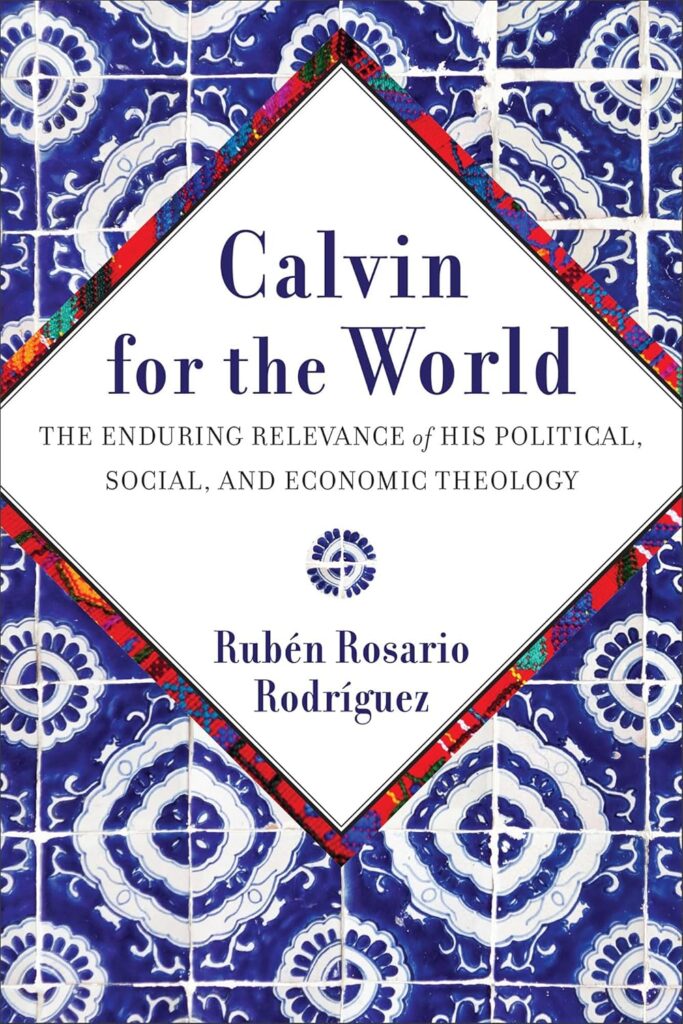THE BOOK
Calvin for the World: The Enduring Relevance of His Political, Social, and Economic Theology
(Baker Academic)
By Rubén Rosario Rodríguez
If you know anything about the 16th-century French Reformer John Calvin, it’s probably one of two things, neither of which do we have space to address now. Lesser known is Calvin the institution builder, economic thinker, social fabric weaver. That’s the Calvin explored in Rubén Rosario Rodríguez’s new book, Calvin for the World: The Enduring Relevance of His Political, Social, and Economic Theology, out August 27 from Baker Academic. Here, Rosario, who holds an endowed chair at the University of St. Louis, offers insight into Calvin’s common good vision.
Theology
“John Calvin wrote The Institutes as a handbook for pastors on how to read and interpret the Bible. For Calvin, there was no differentiation between biblical theology and systematics and ethics. It was all doctrine. If it’s in the Bible, we have to understand it, and then we have to teach it. Ultimately what characterizes him in every area, whether it’s social ethics, economic thought, or preaching, is you’re looking at the world through the lens of the Bible. And then when he reads the Bible, he’s going to look at the Bible through the lens of Christ.”
Free Market
“Calvin supported the need for a banking industry, but he was not one for this idea of an unfettered free market. He was against predatory lending practices. He, in fact, only believed that once a business began to return a profit, only then do you start paying back the loan. It’s very different from modern lending practices, because for him it’s all under this big umbrella of social Christian ethics. What you’re aiming for is not the investors’ profits, but the common good.”
Education
“My grandmother left the Catholic church in the 1940s, and when she did so, her decision to join the Presbyterian church was informed by the fact that the best schools in Puerto Rico were being run by the Presbyterian church. While it might sound like contemporary church shopping on the one hand, on the other hand, it does square up with the Calvinist values of literacy and education and the importance of having an educated laity in order to embody the reforms of the church that the 16th-century reformers were aiming for.”
Interest
“Throughout Christian history, usury, the loaning of money for interest, was considered bad. Not only Aquinas, but Luther himself spoke out against it. Calvin approached it very differently. He was recognizing that there was a shift from the agrarian economy of Middle Ages to an urban and mercantile economy, and that with that came a need to create a banking system and a way of transferring capital for goods. Lending is a necessary way of developing and promoting the common good, because it allows those without the necessary capital to participate in the economic system of growth.”
The ‘Secular’ State
What Calvin did in Geneva is he took the administration of public hospitals out of the hands of the church. Clergy are not trained in management and business. And he basically recruited successful business leaders from the community, lay leaders in the church, and asked them to become deacons and to oversee the finances of the hospital.
Institutions
If Calvin had a genius, it was his organizational mind, his way of taking ideas and implementing them in an institutional setting. Some of the things Calvin’s Geneva is remembered for are the implementation of public hospitals, of public schools, of a public network of social welfare. These ideas were not new. As all of Catholic Europe was moving to an urban mercantile economy, it created certain problems. Calvin was able to implement reforms with the public hospital, with the school system providing for those who are unemployed, for those who were injured in the wars of religion and were unable to work, he created a whole system of social welfare that is now assumed to be part of the modern democratic state.
Government
Wherever you see a resistance to authoritarianism, to a centralized, unilateral use of power, whether in the life of the church or in the life of the state, I see Calvin. Calvin did not trust human nature. Because humanity is fallen, we can not trust humanity with unilateral decision making. There always needs to be checks and balances. And so, not only do you have checks and balances in church governance, but he argued that even though you could be Christian in a monarchy, you could be Christian in a republic, ultimately some form of representative democracy is the best form of government because it allows better for maintaining checks and balances






